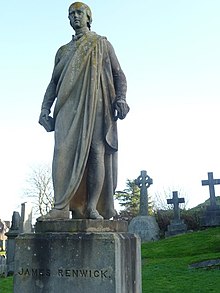James Renwick | |
|---|---|
 Statue of James Renwick, Valley Cemetery, Stirling by Alexander Handyside Ritchie | |
| Born | James Renwick 15 February 1662 |
| Died | 17 February 1688 (aged 26) |
| Occupation(s) | Minister, Covenanter, Martyr |
| Theological work | |
| Tradition or movement | Presbyterian |


James Renwick (15 February 1662 – 17 February 1688) was a Scottish minister who was the last of the Covenanter martyrs to be executed before the Glorious Revolution.[1][2]
He was born at Moniaive in Dumfriesshire, the son of a weaver, Andrew Renwick. Educated at Edinburgh University, he joined the section of the Covenanters known as the Cameronians about 1681 and soon became prominent among them. Afterwards he studied theology at the university of Groningen and was ordained a minister in 1683. Returning to Scotland “full of zeal and breathing forth threats of organized assassination,” says Mr Andrew Lang, he became one of the field-preachers and was declared a rebel by the privy council. He was largely responsible for the “apologetical declaration” of 1684 by which he and his followers disowned the authority of Charles II.; the privy council replied by ordering every one to abjure this declaration on pain of death. Unlike some of his associates, Renwick refused to join the rising under the earl of Argyll in 1685; in 1687, when the declarations of indulgence allowed some liberty of Worship to the Presbyterians, he and his followers, often called Renwickites, continued to hold meetings in the fields, which were still illegal. A reward was offered for his capture, and early in 1688 he was seized in Edinburgh. Tried and found guilty of disowning the royal authority and other offences, he refused to apply for a pardon and was hanged.
- ^ Chisholm 1911, p. 105.
- ^ Irving 1881, p. 430.